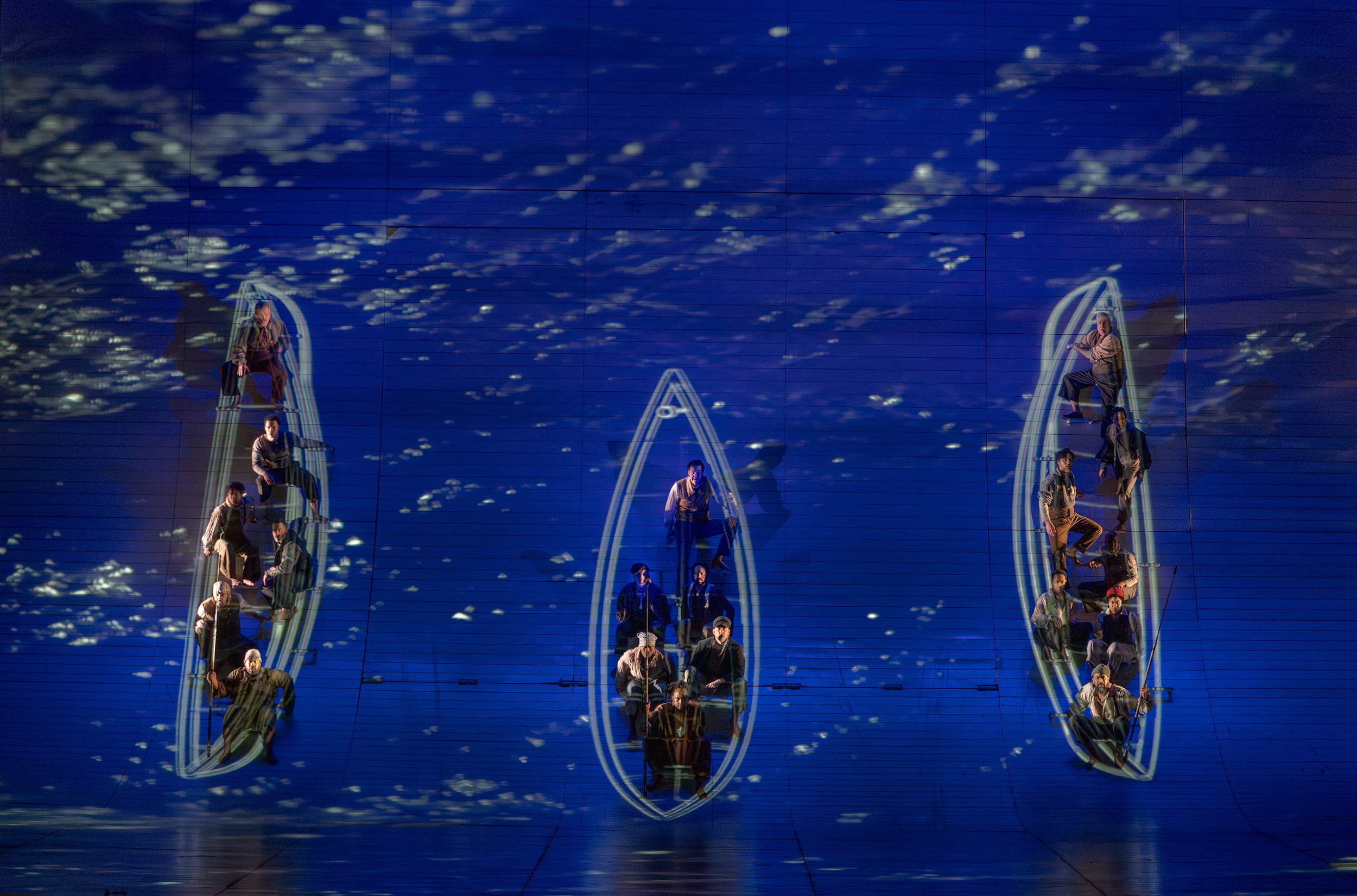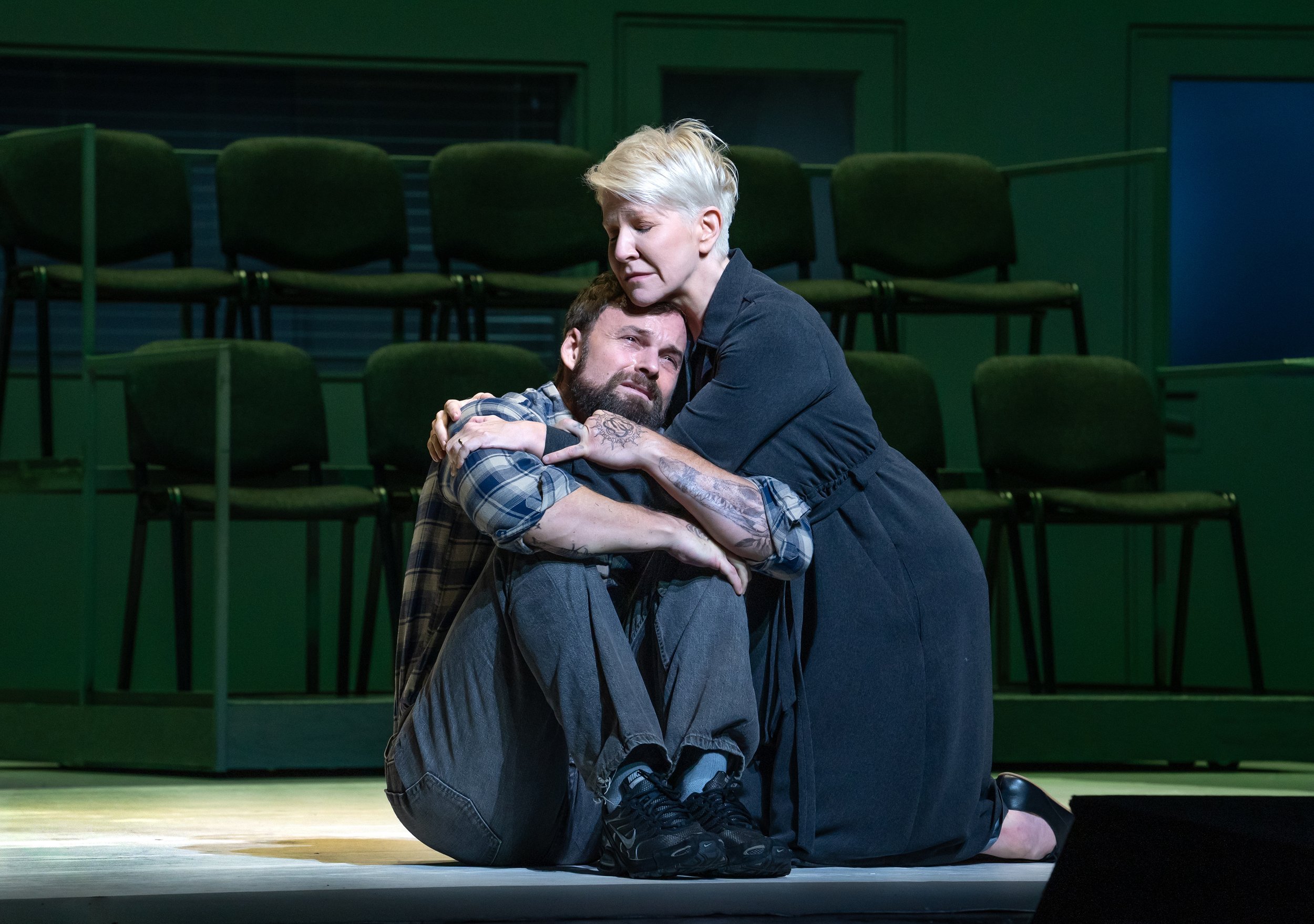His Journey: An Interview With Jake Heggie
Jake Heggie (James Niebuhr)
All in all, 2023 is turning out to be quite the Year of Jake Heggie, the acclaimed classical composer behind the world’s most popular 21st-century opera, Dead Man Walking. This year, Dead Man Walking had its long-awaited Met premiere as the season opener, the Houston Grand Opera likewise opens its season on Friday with his brand-new opera Intelligence, and the New York Philharmonic premiered the suite The Elements in September. The Elements consists of five movements from five composers, including Jake, and — you guessed it — opened the NY Phil’s season. “Quite amazing,” Jake says.
He calls it “sheer coincidence” that his works are opening seasons all over America this year. “I had nothing to do with it, really.” Perhaps not schedule-wise, but his talent has everything to do with it. Or do I spy a plot from the organizations’ general managers to all open their seasons with his works?
That was a joke, reader. In all seriousness, though, how did Jake get from “a small town in Ohio” to the top of the composing world?
His is quite a story, and I got to hear it from the man himself, who generously granted me an interview last month. He told me (and now you!) all about his journey to classical, Dead Man Walking, why he’s drawn to write for mezzo-sopranos, and more! Read on.
Growing up, Jake’s family “didn’t have classical music in the house, though we had every other kind! My father loved big band, swing and jazz, my mom liked pop singers of the day, my sisters were into rock-and-roll, and I loved movies, musicals and especially solo singers like Barbra Streisand, Linda Ronstadt, Carly Simon, Aretha Franklin, Dionne Warwick, Ella Fitzgerald and so on. I didn’t know anything about opera – but I did especially respond to storytelling through the solo voice. My parents bought a very small piano when I was about 7 years old and we all took piano lessons. I loved it from the start. I didn’t start to play classical pieces until I was a teenager, but I was immediately hooked.”
By age 11, he had found his way to classical music and started composing. His progress was fast, and he wrote mostly songs at first. His early journey took him to Paris, UCLA, and eventually to the San Francisco Opera’s PR department. During his time there, he continued to write songs, and though he never fulfilled his dream of composing for Barbra Streisand, singers like Frederica von Stade, Dawn Upshaw, and Renée Fleming began singing his music all over the world.
After that, it wasn’t long until the SF Opera’s then-general director, Lotfi Mansouri, offered Jake the chance to write an opera. Jake had never written an opera before, but Mansouri gave the new commission a spot in the 2000-01 season, made Jake the SF Opera’s official composer in residence, and set up a meeting with librettist Terrence McNally.
The story of their meeting is well known by now, but I’ll retell it anyway. McNally told Jake that he had 10 potential projects, but that he only really wanted to do one. However, they had to be on the same page, so McNally refused to tell Jake which one he wanted. Instead, he started reading the list.
The first words out of his mouth: “Dead Man Walking.” An adaptation of Sister Helen Prejean’s 1993 memoir of her time counseling inmates on death row, later made into a 1995 movie starring Susan Sarandon and Sean Penn.
“I knew to my core it was a brilliant idea,” Jake recalls. The hair on his neck and arms stood up on end, a chill ran down his spine, and he “felt music.” Stop right there, he interrupted. That’s the one.
That also happened to be the one that McNally wanted, and that was the beginning of a beautiful friendship.
Funnily enough, Jake “had not read the book or seen the movie! When Terrence brought it up, I knew immediately what it was because EVERYONE had been talking about it. The movie was very controversial — and the subject of it actually scared me, so I had stayed away.”
Be that as it may, a brilliant idea is a brilliant idea. “He and I rented the video that same day and watched it together ... and then I read the book about 3 or 4 times.” I’m surprised they didn’t buy the video. Before they could get started, though, they needed permission from Sister Helen herself to adapt her book. She agreed, on two conditions. One, Jake wouldn’t write “any of that atonal stuff. There’s got to be a melody, something people can hum.” Two, the crux of the story had to be redemption.
Jake gave her his word. “But, Jake,” the Sister added, “I don’t know boo-scat about operas, so you’re going to have to educate me.” Did he? “I don’t think I educated her!” laughs Jake. “I just welcomed her into the whole process. She was incredibly supportive — and I made sure she knew which direction things were going. I remember making cassette tapes of music for her — sending tunes, ensembles, etc. — as they emerged. She was very appreciative. And she is now deeply appreciative of the power of opera to engage a community and bring an audience into a journey.” Sister Helen mostly goes to Dead Man Walking, as she told me, but she clearly loves it, as she should.
From left: Ryan McKinny, Joyce DiDonato, and Raymond Aceto in Dead Man Walking (Karen Almond/Met Opera)
Once Jake and McNally got started, their creative process was “incredibly generous and collaborative… Total joy from the start,” an interesting contrast with their final product’s emotional heaviness. “Terrence wanted me with him when he was working on the first act libretto, so we went to his home in Key West. We talked and walked every day, and he’d spend all afternoon writing. At the end of the week, he read it to me and I was on fire with it! He told me his goal was first and foremost to inspire music. He kept reiterating that music has to take the lead, and he’d do whatever it took to make sure that happened.”
Jake and McNally turned out to be a dynamite team, going on to collaborate on two more operas (At the Statue of Venus and Great Scott). McNally also suggested making an opera out of Herman Melville’s opus Moby-Dick, a suggestion that Jake took and ran with, even though McNally ultimately couldn’t take on it with him. “We liked each other, liked being in the room together, and felt that we inspired each other,” Jake comments on their fruitful partnership. “He had great respect and appreciation for the music I write, and I had the same respect and admiration for his extraordinary talent. He was also very clear that a big part of his job was to inspire music. To create structure, language, storytelling, etc. ... yes ... but none of that mattered if it didn’t inspire music. We also both recognized that first and foremost, however, is the story — the story — the story ...”
San Francisco Opera premiered Dead Man Walking on October 7, 2000. Jake’s old mezzo-soprano friend Frederica von Stade turned down the role of Sister Helen in favor of singing the death-row convict’s mother, so mezzo Susan Graham sang Sister Helen. The opera was an immediate sensation, receiving acclaim from critics as well as from audiences. Such was the popular rapture that two performances were added to the original run.
Jake tweaked it a few times, but few changes were necessary and after the fourth staging (at New York City Opera), he left it alone. “At a certain point, when it’s working just fine, you have to know when to let go and move on… I don’t think there are any changes I’d make now. It works pretty flawlessly. People ask me all the time: “If you were to write DMW now, would it be different?” and I always respond OF COURSE it would be different! I’m 23 years older and with a different perspective on music, theater, etc., but DMW is a snapshot of the composer I was at that time. And that’s enough.”
The perspectives of the composer Jake was at the time and the composer he is now may be different, but not their fundamental principles and goals. “[M]y goal is always to capture the heartbeat of each moment. To illuminate through music what’s at stake and keep a momentum going — something that compels us to want to know more about the characters and the situation they are in. I try never to tell the characters how they are going to sing – I let them tell me. Most of composition, I find, is listening to what the characters want to say. If I ever find myself dictating the terms, then I stop and wait to find the empathy of their hearts and voices. That’s what inspires and compels me to go forward. If I’m surprised by what happens in the moment, the audience likely will be, as well.”
One of the most exciting things happening in the present is Dead Man Walking’s Met premiere, as I mentioned up top. To many, it may seem natural for the most popular 21st-century opera to come to the world’s best opera house, but for decades, the Met was allergic to modern opera. (I was allergic to it too up until last season.) “I NEEEEVER thought the Met would produce DMW!” exclaims Jake. “So when Peter [Gelb, the Met’s general manager] called and said they were doing it, I was FLOORED. That must have been about 2016. And then, after it had to be postponed due to Covid, he called and said they were making it the opening of the season! Talk about a miracle. Never in my wildest dreams could I have imagined [it].” The final performance of the Met’s Dead Man Walking, starring Joyce DiDonato, will be broadcast in cinemas around the world. Nor do the miracles end there: “in 2018, [Gelb] called to tell me they were also going to produce Moby-Dick in a future season. I’m still pinching myself!”
Since Dead Man Walking’s premiere, Jake has written 7 more operas, though he keeps to produce songs and song cycles like Camille Claudel: Into the Fire, which he wrote for mezzo Joyce DiDonato. “DMW was the doorway to the career I have today. No way would I have had the opportunities that have come my way if it hadn’t been for DMW… it gave me courage to take on big projects and bold ideas.”
One such big, bold project was Moby-Dick, which premiered in 2010 and was another smashing success. “I also try deliberately to challenge myself anew for each project ... I need to feel a little bit terrified at the start. Sort of: “I thiiiiink I can do this, but HOW ON EARTH will I ever do this?!? A new opera is like climbing the mountain all over again. So having a new mountain to climb — a new landscape and perspective — keeps it alive, challenging and fresh.”
Janai Brugger, left, and Jamie Barton in Intelligence (Michael Bishop/Houston Grand Opera)
Nowadays, his new mountain is Intelligence, a Civil War drama about a pro-Union spy ring led by Elizabeth Van Lew, an abolitionist Southerner, and Mary Jane Bowser, an educated slave with a photographic memory. “While doing a project at the Smithsonian with Susan Graham in 2015, a docent told me the story of Elizabeth Van Lew and Mary Jane Bowser,” Jake recounts. “I started looking it up and was amazed that I had never heard of them or their amazing story. I had that shiver of recognition and the fire I need to feel right away. I just knew it had to be my next big project.” Intelligence premieres tonight at the HGO, starring mezzo Jamie Barton, soprano Janai Brugger, and mezzo J’Nai Bridges. After attending the dress rehearsal, mezzo Sasha Cooke called it “the best new opera I have ever seen.”
What do Joyce DiDonato, Susan Graham, Frederica von Stade, Jamie Barton, J’Nai Bridges, and Sasha Cooke have in common? Besides being remarkable singers, the obvious answer is that they’re all mezzos, and Jake has written music for all of them. Jake loves “all the voice types, but the mezzo voice has special resonance” for him. The reason goes all the way back to his childhood listening to Barbra Streisand, Linda Ronstadt, Carly Simon, Aretha Franklin, Dionne Warwick, and Ella Fitzgerald. “They are all women and they all sing in sort of a mezzo range. So my ear was always accustomed to that range and that sound. It was natural for me to be drawn to mezzos once I found my way to opera. I love that there is great beauty and ease through the middle, great drama and power at the top and bottom, and that I can get the words through almost the entire range.”
In a shift, Jake imparts some rapid-fire, short-but-sweet advice to young composers. “Write from your heart. Be prolific. Write for specific performers who inspire you. Explore — yes – but compose authentically and from your heart. Don’t isolate yourself. Connect out in the world. Collaborate. Be a good colleague."
He also underscores the value of networking early on: “It’s important to remember that as you are learning, you also need to start building a company — because you need to be an entrepreneur. Nobody’s going to do this for you. You need a team and you need to find your champions: the people who believe in you and who will program, commission and send out your music… It’s also important to remember that the professional world is very different from the academic world. Meet people, go backstage… and put yourself in a place where opportunities might emerge. I was in the PR/Marketing Dept at San Francisco Opera when everything opened up for me. I couldn’t have imagined it – but turned out I was in the right place at the right time.”
Sadly, it’s not the right time to talk about “some exciting things” in Jake’s future; that will have to wait “until the company commissioning the work announces it”. He named Shakespeare in Love as a movie that he would love to operacize, though I doubt he would have said so if it was already in the works. If it is, I’m counting on Viola de Lesseps being a mezzo. Else, definitely Queen Elizabeth II.
On opera’s future, he’s more open, striking a note of hope. “It’s definitely in a very difficult place right now. But this art form is enormously flexible and versatile. Look at its history. And I feel that in America right now, we are in a golden age of new opera and exploration comparable to what happened in Italy in the 17th century. Lots of composers, ideas, possibilities being explored. Eager performers who are ready to take on new work — who build entire careers based on new work. Companies large and small championing new work and celebrating a diversity of ideas and perspectives. That’s thrilling. BUT, we have to work ferociously to stay connected to the public, to welcome new people in, and to find out who the next philanthropists are who will love, nurture and support this work.”
At the turn of the century, Dead Man Walking was crucial to the genesis of this “golden age of new opera,” so if indeed we are in one, some of the credit should go to Jake.






